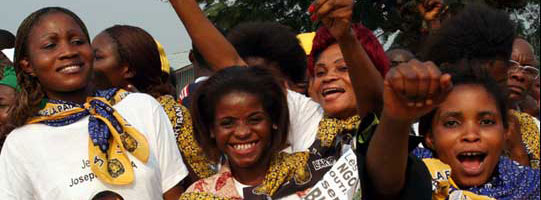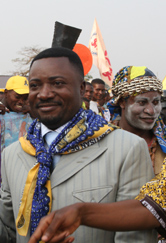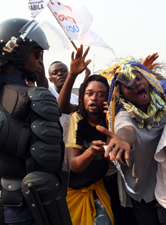
By Jason Stearns and Michela Wrong
Jason Stearns is a senior analyst at the International Crisis Group. He offers this analysis of the election and the challenges facing the incoming government. This article is based on the authors’ previous commentary in the FINANCIAL TIMES. Michela Wrong spent six years covering the African continent for Reuters, the BBC, and the FINANCIAL TIMES. Her first book, IN THE FOOTSTEPS OF MR. KURTZ, won a PEN award for nonfiction. She lives in London and travels regularly to Africa.
Ruling through peace after years of relying on violence doesn’t come easy. This point was proved by three days of fighting that broke after the first round results of the presidential elections in the Congo were announced on 20 August. No candidate was able to win an absolute majority and the two front-runners — current President Joseph Kabila and Vice-President Jean Pierre Bemba — will face each other in a run-off at the end of October. As the results were announced, the bodyguards of these two figures unleashed a firefight in the center of town that killed over thirty people. The violence serves as a reminder that elections, far from ushering in peace, could actually trigger more violence as the losers re-arm and launch another rebellion.

A candidate greets voters at a rally. Candidates increase rally turnout with offers of free T-shirts or food. |
To prevent this, the international community must invest more in creating a national army and police force that are apolitical and not available to the machinations of political leaders. Equally important is for politicians to realize that they can effect change — and have a career — through the political system rather than through warfare. For this, the Congo needs all the trappings of a legitimate democracy: a strong parliament with an effective opposition, independent courts and a genuine sense of government accountability.
These are not abstract needs: corruption is one of the biggest killers in this country. A brief encounter in the hills of eastern Congo illustrates the point. Three women were walking in front of us on a dirt trail recently, each weighed down by a 100-pound sack of flour. Sitting on the path was a soldier with his AK-47 between his knees. The women dumped their bags on the ground and, without being asked, handed over the equivalent of 20 cents — almost half their daily wages. As they lifted their bags, the soldier grinned at us and said: “Chai yangu – my tea.”
Multiply this one incident by tens of millions of Congolese who face the same petty yet devastating corruption every day and you understand why people here see their state primarily as a predator. It is not there to serve its citizens but to run a massive extortion racket. The government provides next to no healthcare, education or even security for its citizens. In a recent survey carried out by the World Bank, Congolese were asked how they would treat the state if it was a person. “Kill him” was a frequent reply.
Predation and the failure of state institutions help explain the “Congolese paradox”: a country that remains one of the poorest in the world in spite of its enormous mineral wealth. Congo contains some of the largest deposits of copper, cobalt, diamonds and gold but 80 per cent of the population makes less than a dollar a day. Almost a third of the population only eats once a day.
The challenge is to transform a predatory government into one that actually delivers services. The international approach has focused on “setting up systems”. This means establishing payroll mechanisms, retiring redundant staff and providing the infrastructure for officials to do their work. These investments have been crucial but, as a World Bank official explained, their shortcomings are clear: “Systems are good — but if the people in the systems are corrupt, you haven’t got very far.”
This past year, between 60 and 80 per cent of customs revenues were estimated to have been embezzled, a quarter of the national budget was not properly accounted for and more than $3 million were stolen from the army payroll. In spite of this, not a single Congolese official has been convicted on corruption charges during the past three years of transitional rule.
There are concrete steps that can be taken to remedy this situation. First, life must be breathed into the different branches of government. The parliament has launched some good initiatives, including an audit of state companies and a review of mining contracts, but it has not been able to push through any of its recommendations. The incoming government will provide a new opportunity to strengthen the legislature’s impact at the national and local level. Twenty-six new provincial assemblies will be set up that could, if endowed with the necessary resources and checks and balances, make local administration more accountable.
Similarly, the courts, which act as more of an appendix to the executive branch than a check on power, must be given the salaries, infrastructure and resources necessary to do their job and resist corruption. Without international aid, this will be impossible.
Second, the Congo’s resources must be made to benefit the whole population. Much of the country’s mineral wealth has been signed away in the past few years to international companies. The terms of many of these contracts barely benefit the Congolese state or people. The parliament and the World Bank, which has invested millions in reforming the mining sector, must pressure the Congolese government to review these contracts and amend them if necessary.
More than 1,200 people continue to die every day in the Congo from the humanitarian consequences of the conflict. Elections alone will not bring an end to this tragedy but creating a functioning state just might.

